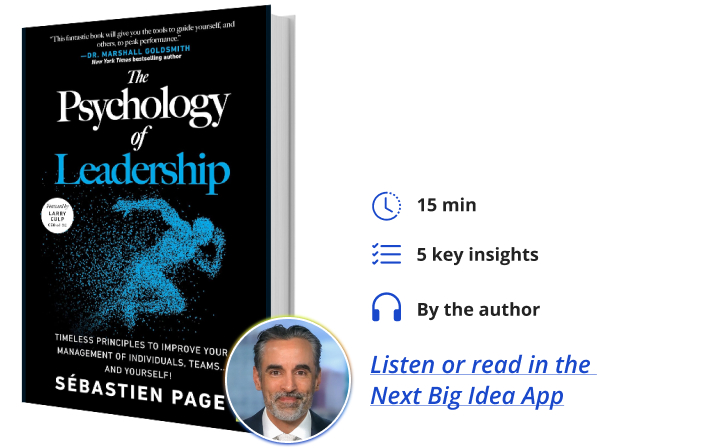Sébastien Page is the Chief Investment Officer at T. Rowe Price, a Fortune 500 company where he oversees more than $500 billion in assets. He has authored two finance books and has received six annual research paper awards. He frequently appears on CNBC and Bloomberg TV, and in 2022, he was named a Top Voice in Finance by LinkedIn. He is extensively quoted in the New York Times, The Wall Street Journal, and Barron’s. For this book, he hired a PhD sports psychologist as a scientific referee to review his interpretation of the psychology research.
What’s the big idea?
Peak performance is a dangerous, albeit rewarding, adventure. There are plenty of hurdles on the path to sustainable success that can damage well-being or hinder positive outcomes. The Psychology of Leadership identifies timeless pillars of strong, ethical, lasting leadership.
Below, Sébastien shares five key insights from his new book, The Psychology of Leadership: Timeless Principles to Improve Your Management of Individuals and Teams…and Yourself! Listen to the audio version—read by Sébastien himself—in the Next Big Idea App.

1. Measurable goals are dangerous.
Let me ask you an uncomfortable question: what would it take for someone to convince you to put a gun to your head and play Russian roulette? Suppose the hypothetical gun had one hundred chambers and was loaded with four bullets. You’d have a four percent chance of dying. How big would the reward have to be for you to spin the chamber and press the trigger? Would you do it for a million dollars? Ten million? One hundred million?
Click!
If you’ve reached the summit of Everest, I admire and respect you. At the same time, let me ask you: why? There’s an area called the Death Zone where you climb over frozen dead bodies to reach the summit. Over the last 30 years, four of every 100 climbers who have summited have died—hence my Russian roulette question.
Reaching the summit of Everest may be an irresistible goal because it’s a challenging and prestigious achievement. More than anything else, it’s a well-defined, measurable goal. You either reach the summit or you don’t.
Research in psychology reveals that goal-induced blindness, which happens when you’re so obsessed with reaching a goal that you don’t see the negative consequences of your actions, leads people to sacrifice their well-being or lie and cheat.
Measurable goals are essential in leadership and life, but they’re also dangerous. Prevent goal-induced blindness by prioritizing well-being and ethics. Know when to abandon the climb.
2. Billionaires are horrible role models.
I used to admire billionaires, but as I researched their lives and read countless biographies, I was taken aback by how many of them are, basically, real jerks! Most billionaires are terrible at relationships. The more I read about Steve Jobs, Elon Musk, Jeff Bezos, and others, the more I thought, wow, they’re often quite…miserable.
“It’s unnecessary to be a jerk or sacrifice family life in the name of accomplishment.”
Did you know there have been 13 divorces among the ten richest men in the world? It’s absolutely okay to pursue massive financial success. But there has to be more to it. It’s unnecessary to be a jerk or sacrifice family life in the name of accomplishment. In fact, renowned author Daniel Pink showed that focusing on external rewards, like making lots of money, may actually impede, instead of promote, self-motivation.
Choose your role models carefully. You may be more influenced by whom you admire than you think. Research in psychology reveals that if you identify with a celebrity, you are likely to change your attitudes and behaviors to be more like them. This does not only apply to teenagers who want to dress like Taylor Swift. It applies to everybody.
3. It’s okay to compare yourself to others.
Social comparison can damage your self-esteem. In his book David and Goliath, Malcolm Gladwell explains that high-achieving, but not genius-level, students who attend Ivy League universities tend to give up on their ambitions more than other students. They begin questioning their abilities by comparing themselves to Mozart-level students.
But there is nothing wrong with wanting to win! Competition is a fantastic motivator. I’m a runner. My fastest runs have always been during races. Dr. Dan Zimet, a sports psychologist, told me he’s rarely met an elite athlete who, as a child, never had the thought, “I want to be the best!”
Humans seem wired for social comparison. There’s an entire field of study in psychology devoted to it. Research suggests that as much as ten percent of your thoughts involve comparisons to others. You compare how successful you are, how you look, how much money you make, how smart you are… How often do you think about these things? Be honest! The trick is to be self-aware and put the motivational power of social comparison to good use.
4. Stress is good.
The Yerkes-Dodson law is a model used in sports and popular psychology to map performance to your degree of arousal (activation) or stress. This law assumes that performance increases with stress, but up to an optimal point, after which anxiety hurts performance.
“As you calibrate your goals, don’t make them too easy or too hard.”
To be clear, when they describe the YD law, most psychologists refer to “arousal” instead of stress. They use the term arousal as a broader concept, including alertness and vigilance.
The bottom line is that you should not assume all stress is bad. For optimal performance, research in sports psychology shows that you shouldn’t try eliminating stress. Instead, find your optimal stress level. As you calibrate your goals, don’t make them too easy or too hard. The more complex the work is, the more you need to concentrate, and the lower the optimal stress level.
Like an elite athlete, realize that you can’t operate at your level without a bit of stress. Isn’t that liberating? Now you can stop stressing about stressing. As author and lifestyle guru Tim Ferris says, “Embracing stress is like a superpower.”
5. Leaders should be less decisive.
I once worked with a remarkably patient and wise business leader. If someone came to him with an “urgent” problem, he would evaluate whether it was critical and time-sensitive. When needed, he was comfortable taking decisive action. Otherwise, he would wait and see how things unfolded. Most of the time, the issues were resolved without his involvement.
In his book Originals, psychologist and author Adam Grant praises procrastination. He explains that “leaders who drive change effectively are those who wait patiently for the right moment.” The most common error in judgment with multistage decisions is that most of us don’t take advantage of the time we have left. Our standards go down too quickly. We want to get it done.
Control theory teaches us to use time to our advantage to keep our options open. I call it strategic patience. Don’t rush decisions when you don’t have to. When you need to choose amongst competing options—for example, when hiring someone—your standards should be a function of how much time you have left to decide. Most of us have a bias to action. We underestimate how high our standards should be when there’s more time.
To listen to the audio version read by author Sébastien Page, download the Next Big Idea App today:































